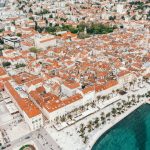ZAGREB, May 26, 2019 – The polls opened at 7 am on Sunday throughout Croatia for voters to cast their ballots for the election of 12 deputies to the European Parliament (EP) who will represent Croatia in that body for the next five years.
The State Election Commission called on voters to exercise their right and cast their ballots.
There are 3,832,000 eligible voters with residency status in Croatia and another 154,000 who have the right of vote but do not reside in Croatia (the diaspora).
Croatia is voting for MEPs through open slates which means that voters cast their ballot for a party slate and in addition they can vote for a particular candidate on that slate to whom they wish to give priority in relation to other candidates on the slate.
Croatians can choose between 33 slates, as against 25 slates registered for the EP elections in Croatia five years ago. Thus, a total of 396 candidates are running now for the 12 seats reserved for Croatia in the new European legislature.
Eligible voters can cast their ballots at 6,360 regular and another 70 special polling stations in Croatia which will close at 7 pm. Croatians can also vote in 46 other countries at 119 polling stations. The first polling stations for Croats outside Croatia opened in Australia at 11 pm Saturday according to Croatian time.
Elections for the European Parliament are held in all member states of the European Union between 23 and 26 May 2019, as decided by the Council of the European Union.
Polls opened on May 23 first in the Netherlands, then half an hour later the election began across the U.K., as both nations kicked off the four-day election process, marking the ninth occasion since the first direct elections in 1979. The current number of MEPs is 751, although those seats are set to drop to 705 when the U.K. leaves the bloc.
Latvia, Malta, and Slovakia voted on May 25, while the Czech Republic had two days to go to ballots on May 24 and 25. The remaining countries, including Croatia, are voting on Sunday. Final results from all 28 EU nations will be published after voting ends late Sunday.
Every five years EU citizens choose who represents them in the European Parliament. The EP is elected by direct universal suffrage and elections must be based on proportional representation and use either the list system or the single transferable vote system. In some countries including Croatia, the order on the list may be changed using the transferable (preferential) vote system.
The results of the voting in Croatia will be announced after 11pm on Sunday.
More European election news can be found in the Politics section.








